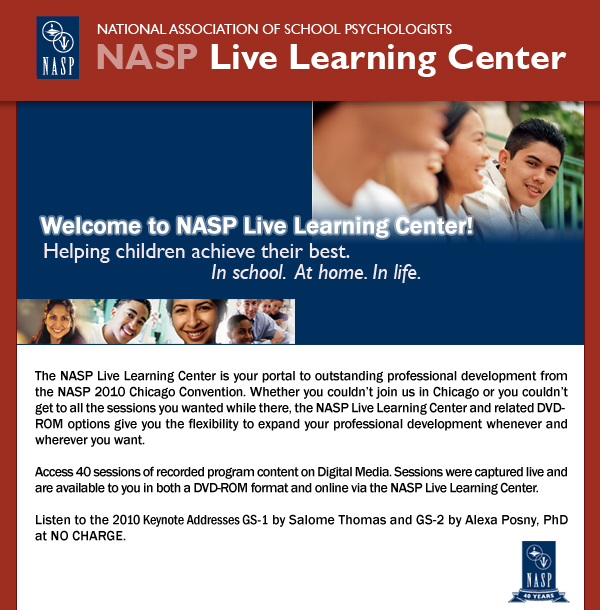
NASP 2010 – Sample Sessions
GS-1 The Immortality of Influence: Believing Every Child Can Achieve Their Dreams
Salome Thomas-EL
Date: Wednesday, March 03, 2010
Time: 10:30 AM to 11:30 AMGS-2 Including Your School Psychologist: A Better, Bolder Approach to Education
Alexa Posny, PhD, Office of Special Education Programs,, U.S. Department of Education, Washington, D.C.Date: Wednesday, March 03, 2010
Time: 11:30 AM to 12:30 PMNASP 2009 Annual Conventions
Click on the title below to listen to the 2009 Convention Keynote.The Nature and Development of Angry and Aggressive Behaviors: Implications for School Psychologists
Donald Meichenbaum, PhD
Please Note: Dr. Meichenbaum did not use a PowerPoint presentation so there is none to view for this session.Donald Meichenbaum, PhD is Distinguished Professor Emeritus at the University of Waterloo, Ontario, Canada and Distinguished Visiting Professor at the School of Education, University of Miami. He is Research Director of the Melissa Institute for Violence Prevention in Miami, Florida. Dr. Meichenbaum is one of the founders of cognitive behavior therapy and his book Cognitive Behavior Modification: An Integrative Approach is considered a classic in the field. He has also authored several other books including Stress Inoculation Training, A Clinical and book for Assessing and Treating Adults with Post-traumatic Stress Disorder, and treatment of Individuals with Anger-Control Problems and Aggressive Behaviors: A Clinical Handbook. He was one of the founders of the Journal of Cognitive Therapy and Research as well as being on the editorial boards of a dozen other journals. Dr. Meichenbaum considers the nature of anger and how aggressive behavior develops from a lifespan perspective. He discusses the implications for both assessment and school-based interventions, highlighting gender differences and the role of school-readiness skills. He also will explore why "smart" children keep getting smarter and other students fall farther and farther behind and what can be done to close this gap.
Listen to these samples from the 2008 Annual Convention!
Interventions Within An RTI Framework
Amanda M. VanDerHeyden, PhDAn important step in a research-based RTI process (STEEP) is class-wide intervention. This presentation provides the "how-to" details needed to successfully plan and implement class-wide interventions in both reading and mathematics within the school setting. Participants will learn how to implement, monitor, and base decisions on intervention data. Intervention protocols for identifying classes in need of intervention, working with the teacher to prepare for implementation, and monitoring intervention integrity and effectiveness. Student graphs, various treatment options, and information on obtaining reading and math probes are provided.
Self-Injury: Insights and Testimony
Scott Poland, Rich LiebermanSelf-injury (SI) is a complex behavior separate and distinct from suicide that fulfills a multitude of needs in adolescents. School psychologists are overwhelmed with referrals of self-injurious students and must stay current on evidence-based intervention strategies. To raise awareness of the biological, psychological and environmental factors that combine to produce SI, this workshop will feature the testimony of two young women who founded a SI support group in Tulsa, OK and received a National Mental Health Association Award for their willingness to help others. Participants will leave with strategies to develop school guidelines for prevention and intervention.
Implementing Positive Behavioral Supports in the High School
Randy Sprick, PhDThis session assumes that participants already understand the basics of school-wide and individual student behavior support, including data-driven decision making and the importance of a functional leadership team. From there, the workshop examines processes for involving the entire high school staff in actual implementation of a continuous improvement model. This examination includes (a) politics of team formation, (b) processes of team functioning, (c) communication and total staff involvement, and (d) strategies for improving average daily attendance. In addition, the session discusses how to heal the circulatory system of schools by alleviating hallway and restroom tardiness.
Don’t miss this exciting Multimedia opportunity! For more information,
visit www.softconference.com/nasp.Order today and get your Education to Go!
Copyright © 2010 National Association of School Psychologists and Content Management Corp.
All rights reserved.

